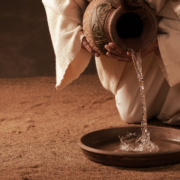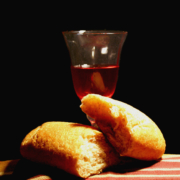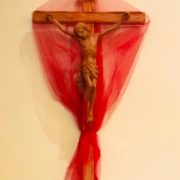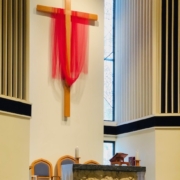
I’ve never lived in an enemy occupied territory. There are people still alive today who might have lived in Nazi occupied Europe, or in politically suppressed parts of Africa or Asia. In a
spiritual sense, we currently live in enemy occupied territory, like the residents in C.S. Lewis’
Narnia Chronicles, that mythical place of talking animals and dwarfs, waiting for the return of Aslan, the great lion. Sounds something like The French resistance: a loosely organized coalition of farmers and shopkeepers working to subvert the Nazi Occupation through military outposts during WWII operating behind enemy lines in Western Europe. Maybe we feel like we’re living in a Post-Christian world, outnumbered, like the “old Narnians” who lived in exile among the woods, under the Witch’s spell, where it was “Always winter, but never Christmas.”
What if the atheists and the hate mongers get the upper hand? What if the Church is ridiculed and marginalized? Would Jesus be caught off guard? He’d probably say, “Business as usual. Now get back to work!” Maybe these current times under the oppression of COVID 19 makes us feel like an oppressed people, without any geographical or age boundaries. The prophet Isaiah writes, “You, O Israel will be as the sand of the sea, a remnant of them will return.” What a wonderful vision of the Church on earth; an unlikely fellowship of heroes who overcome their enemy – not as a conquering army of the elect, but a few stubborn survivors straggling back to claim their rightful inheritance. An inheritance granted by our baptism and won for us by the blood of the Lamb.
How many of you have ever experienced a lot of pain to get what you want? How many of you ever had a baby? How many of you have ever had a baby without an epidural? Passed a kidney stone? Been immobilized by back pain? Now multiply that pain by ten and you’ll begin to get an idea of what Jesus suffered on the way to his death. Or maybe the worst pain you’ve ever had was emotional pain. I suspect that Jesus went through that on Good Friday as well. Jesus, the “Ultimate Blood Donor” – His pain was our gain.
This Sunday is Palm Sunday, the beginning of Holy Week when we recall those final days of Jesus’ earthly life, beginning with his trial before Pilate and culminating in his death and burial. He was accused of accepting claims about being a King. He wasn’t simply “King of the Jews;” but King of the Romans, Greeks, and everyone else who has ever lived. So is Christ king of our life? Who’s our King? If our King is Lord of the world, the flesh, and the devil, maybe we should be spending more time each day reading the Bible and worshiping Jesus. Are we building a life on a solid foundation; not one of sand which easily erodes when the storms of life overtake us?
They say that history is written by the victors. It’s curious that the Gospel writers and editors don’t omit the gory details of Jesus’ last hours on earth. Why would they leave in the unflattering events of his last days? Precisely because God wants us to know that in a world of pain and sorrow, he suffered too! Jesus told his disciples to take up their Cross daily, not once, or only occasionally, but daily. You see, we are fighting a spiritual battle, but a battle that involves flesh and blood. Do we allow others to help us carry our cross? Most of the disciples hid in secret, but the beloved disciple St. John, and the Blessed Mother stood by at the end. “Keep, O keep us, Savior dear, ever constant by thy side; that with thee we may appear at the eternal Eastertide.” (Hymn 150, vs 5)
NOTICES for this week
- Palms – blessed palms will be available for you on Saturday, April 4that 5:00 p.m. as a drive-by in the church parking lot until 5:30 p.m. Thereafter a receptacle of palms will be available for you. Limit one per household please.
- View Palm Sunday Mass – a video will be posted on the church’s website, Facebook via our YouTube channel. Don’t forget to subscribe free so that we will in the future be able to retain our site.
- Urgent Message – Please continue to pray for an end to the COVID-19 virus and its victims and thank you for your continued financial support (check, automated bank transfers or electronic donations via comor Facebook donate button or PayPal) to the life and witness our congregation in this community.
- In case of a pastoral emergency, you can leave a message on our voice mail, and we will respond as quickly as possible. Please continue to pray for an end to the COVID-19 virus, for its victims, and for those who are working on preventative measures.
Please Pray – For the sick: Sandy, Kim, Joe, Steve, Bob, Linda, Francine, Timone, Donna, Ashlyn, Robin. For birthday celebrations: Walter Dzubiak, Mara Walter, Emma Erickson, Martha L’Abbe. For those celebrating a wedding anniversary: Charles & Margie Sandell, Maria & Matthew Hogan. For the faithful departed, and for our expectant mothers: Dani and Andrea. For the faithful departed: George Pinnock, Jr.
Lord Jesus Christ, Son of the Living God, Physician of the body and soul, You restored sight to the blind, healed the lame and cured those with leprosy. Grant, we beseech You, the necessary knowledge and perseverance to all who are working on a vaccine to quickly end the spread of COVID-19. Have mercy on those who have died, and grant comfort to all who are affected in any way and those who are living in apprehension. Give us the grace each day to trust in You and Your living mercy. We ask this in the name of the Father, the Son and the Holy Spirit. Amen.
https://www.facebook.com/SaintDavidsInThePines/
 Palm Sunday – The Passion of our Lord and Savior Jesus Christ – 3/05/20
Palm Sunday – The Passion of our Lord and Savior Jesus Christ – 3/05/20
Isaiah 50:4-9a This is the second of four “servant poems” in Isaiah. The writer may have been thinking of an individual or of the nation as a whole or of the coming Messiah, but N.T. writers saw in his words a description of the passion of our Lord.
Psalm 31:9-16 This is the prayer of lamentation and thanksgiving of one who has suffered from illness (v 10), persecution (v. 4), and being shunned by friends (v. 11). He finds in God his refuge and strength (vss. 1999-22) and counsels others that the way of faith is the source of one’s strength in adversity (vss. 23-24).
Philippians 2:5-11 Here in a nutshell is Paul’s belief about Jesus Christ. He who humbled himself to become a man and to die on the cross is the Lord of all.
Matthew 27:1-54 This is the account of the passion and death of Jesus Christ. In its entirety it begins in the garden of Gethsemane, where he was arrested, and includes his arraignment before the Sanhedrin, his trial by Pilate, crucifixion, death, and burial. The shorter version comprises the trail by the Roman governor, crucifixion, and death.
Challenge Questions
- As you read the Gospel Lesson for the Liturgy of the Palms in Matthew 21:1-11, try to imagine the scene as Jesus centers Jerusalem at the beginning of Holy Week. What kinds of persons today receive similar “red carpet” treatment? What do these choices tell us about the values of our culture?
- As you listen to the Passion story, choose one of the characters in this drama and imagine the event through his or her eyes. What added insights do you have about what happened?
- Pay particular attention to the words and actions of Jesus himself (26;64; 27:11; 27:4-50). What picture of Jesus emerges for you?
- In 27:54, why do you think the centurion and his cohorts declare that Jesus was truly the Son of God?
- Read the Epistle for today in Philippians 2:5-11. How is the meaning of the life of Jesus expressed in this hymn?
 The Thursday in Holy Week. It is part of the Triduum, or three holy days before Easter. It comes from the Latin mandatum novum, “new commandment,” from Jn 13:34. The ceremony of washing feet was also referred to as “the Maundy.” Maundy Thursday celebrations also commemorate the institution of the eucharist by Jesus “on the night he was betrayed.” Egeria, a fourth-century pilgrim to Jerusalem, describes elaborate celebrations and observances in that city on Maundy Thursday. Special celebration of the institution of the eucharist on Maundy Thursday is attested by the Council of Hippo in 381. The Prayer Book liturgy for Maundy Thursday provides for celebration of the eucharist and a ceremony of the washing of feet which follows the gospel and homily. There is also provision for the consecration of the bread and wine for administering Holy Communion from the reserved sacrament on Good Friday. Following this, the altar is stripped and all decorative furnishings are removed from the church. (https://episcopalchurch.org/library/glossary/maundy-thursday). An Episcopal Dictionary of the Church is a wealth of valuable information.
The Thursday in Holy Week. It is part of the Triduum, or three holy days before Easter. It comes from the Latin mandatum novum, “new commandment,” from Jn 13:34. The ceremony of washing feet was also referred to as “the Maundy.” Maundy Thursday celebrations also commemorate the institution of the eucharist by Jesus “on the night he was betrayed.” Egeria, a fourth-century pilgrim to Jerusalem, describes elaborate celebrations and observances in that city on Maundy Thursday. Special celebration of the institution of the eucharist on Maundy Thursday is attested by the Council of Hippo in 381. The Prayer Book liturgy for Maundy Thursday provides for celebration of the eucharist and a ceremony of the washing of feet which follows the gospel and homily. There is also provision for the consecration of the bread and wine for administering Holy Communion from the reserved sacrament on Good Friday. Following this, the altar is stripped and all decorative furnishings are removed from the church. (https://episcopalchurch.org/library/glossary/maundy-thursday). An Episcopal Dictionary of the Church is a wealth of valuable information.


 Only three more days left in Lent. For those of us quarantined in our homes, time “doesn’t fly,” to paraphrase the familiar quote. But in reality, what is time really? During Holy Week, we are not simply recalling some historic events which happened a long time ago in Jerusalem. Nor, under normal circumstances, do we re-enact a pageant with no meaning. The liturgical ceremonies which we would normally observe this week make us more aware of another world, an eternal kingdom of heaven, an unseen world of mystery where all things are being made new, and where we might be even more at home than we are in this world.
Only three more days left in Lent. For those of us quarantined in our homes, time “doesn’t fly,” to paraphrase the familiar quote. But in reality, what is time really? During Holy Week, we are not simply recalling some historic events which happened a long time ago in Jerusalem. Nor, under normal circumstances, do we re-enact a pageant with no meaning. The liturgical ceremonies which we would normally observe this week make us more aware of another world, an eternal kingdom of heaven, an unseen world of mystery where all things are being made new, and where we might be even more at home than we are in this world.
 Enjoy this video of our Holy Eucharist celebration and Scriptures for the Day.
Enjoy this video of our Holy Eucharist celebration and Scriptures for the Day.
 I’ve never lived in an enemy occupied territory. There are people still alive today who might have lived in Nazi occupied Europe, or in politically suppressed parts of Africa or Asia. In a spiritual sense, we currently live in enemy occupied territory, like the residents in C.S. Lewis’ Narnia Chronicles, that mythical place of talking animals and dwarfs, waiting for the return of Aslan, the great lion. Sounds something like The French resistance: a loosely organized coalition of farmers and shopkeepers working to subvert the Nazi Occupation through military outposts during WWII operating behind enemy lines in Western Europe. Maybe we feel like we’re living in a Post-Christian world, outnumbered, like the “old Narnians” who lived in exile among the woods, under the Witch’s spell, where it was “Always winter, but never Christmas.”
I’ve never lived in an enemy occupied territory. There are people still alive today who might have lived in Nazi occupied Europe, or in politically suppressed parts of Africa or Asia. In a spiritual sense, we currently live in enemy occupied territory, like the residents in C.S. Lewis’ Narnia Chronicles, that mythical place of talking animals and dwarfs, waiting for the return of Aslan, the great lion. Sounds something like The French resistance: a loosely organized coalition of farmers and shopkeepers working to subvert the Nazi Occupation through military outposts during WWII operating behind enemy lines in Western Europe. Maybe we feel like we’re living in a Post-Christian world, outnumbered, like the “old Narnians” who lived in exile among the woods, under the Witch’s spell, where it was “Always winter, but never Christmas.”
 Special Weekday Message – April 1st – Fr. Thomas
Special Weekday Message – April 1st – Fr. Thomas